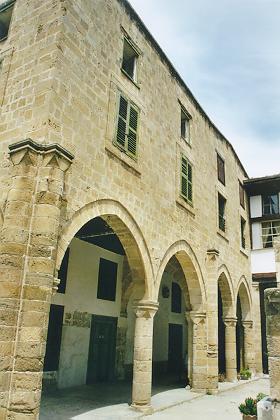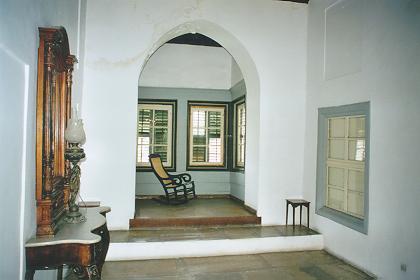Muhassil (Lieutenant-governors)
1690 - ... Hiful-oglu Ahmed Pasha
17.. – 1716 ...
1716 - 1718 Köprülüzade Damad Numan Pasha (b. 1670 - d. 1719)
1745 Mustafa Bey
Walis (governors)
1745 – 1746 Abdallah Pasha
1746 - 1748 Abubekr Pasha
1748 – c.1759 ....
c.1759 – 17.. Kasim Aga
1764 Chil Osman Aga (d. 1764)
1764 - 1765 Hafiz Mehmed Efendi
1765 – af.1768 Süleyman Efendi
1766 - 1766 Halil Aga (in rebellion) (d. 1766)
1771/72 – 177. Haci Ismail Aga
177. – 1775 Haci Ali Aga (d. 1775)
1775 - 1777 Hüseyin Celebi Aga (1st time)
1777 – 1783 Haci Abdelbaqi Aga
1783 - 1785 ....
1779 - 1809 Haci Georgakis Kornesios (d. 1809)
(de facto)
It's very interesting a GC governed Cyprus for nearly 30 years. Hahahahah! I didn't know that there was a defacto GC governor of Cyprus. Anyone has any knowledge about it?
http://www.worldstatesmen.org/Cyprus.html
Defacto Governor of Cyprus:Haci Georgakis Kornesios(1779)
32 posts
• Page 1 of 4 • 1, 2, 3, 4
-

insan - Main Contributor

- Posts: 9044
- Joined: Mon Jun 30, 2003 11:33 pm
- Location: Somewhere in ur network. ;]
Haci Georgakis Kornesios.....................1779-1785
unknown
Huseyin Celebi Aga (restored)..............1788-c.1800
Hasan Agac...................................1800-1808
Ahmed Pasha..................................1808-1810 ?
It seems after a while the Ottoman rule restored by Huseyin Celebi Aga.

http://www.hostkingdom.net/Cyprus.html
unknown
Huseyin Celebi Aga (restored)..............1788-c.1800
Hasan Agac...................................1800-1808
Ahmed Pasha..................................1808-1810 ?
It seems after a while the Ottoman rule restored by Huseyin Celebi Aga.
http://www.hostkingdom.net/Cyprus.html
-

insan - Main Contributor

- Posts: 9044
- Joined: Mon Jun 30, 2003 11:33 pm
- Location: Somewhere in ur network. ;]
Under Ottoman rule and especially from 1750 onward, the Maronite Church in Cyprus was under the jurisdiction of the Greek Church, "all the Maronite churches in the villages are subject of the Greek Bishops of the dioceses in which they are situated, in accordance with the Sultan's berats; these Bishops grant them dispensations for marriage and divorce…" (Hill 1972: 382). The Greek bishops remained in control and persecuted the Maronites "even to the shedding of blood; Archbishop Chrysanthos and the Dragoman Hajigeorgiakis Kornesios left a bad name behind them" (ibid. 1972: 382).
http://www.mari.org/JMS/july98/A_Readin ... istory.htm
http://www.mari.org/JMS/july98/A_Readin ... istory.htm
-

insan - Main Contributor

- Posts: 9044
- Joined: Mon Jun 30, 2003 11:33 pm
- Location: Somewhere in ur network. ;]
While the Ottomans ruled, the Greeks, who had gained a bit of advantage for a while, began their retaliation against the Catholics –– which meant the Maronites, who were the only Catholics left on the island (Palmieri 1905: col. 2464). The vengeance of the Greeks began with the confiscation of the Maronite churches and was magnified by their accusation that the Maronite clergy was working for the return of Venetian rule to Cyprus and was plotting against the Ottoman Empire before the Sublime Porte in Istanbul. Consequently, the Ottomans inflicted their anger on the Maronites. They killed, exiled, imprisoned and enslaved many. They obliged many others to embrace the Greek Orthodox rite and to obey the Greek hierarchy. This persecution caused a considerable number of Christians, including a good number of Maronites, to adopt Islam as a survival mechanism (Cirilli 1898: 11, 21; Palmieri 1905: col. 2468).
By 1636, the situation had become intolerable and the conversions to Islam began. "Since not everyone could stand the pressures of the new situation, those unable to resist converted to Islam and became crypto-Christians, mostly Armenians, Maronites and Albanians in the northern mountain range and along the north coast, particularly at Tellyria, Kambyli, Ayia Marina Skillouras, Platani and Kornokepos" (Jennings 1993: 367). The Maronites who adopted Islam were centered in Louroujina in the District of Nicosia and were called Linobambaci -- a composite Greek word that means men of linen and cotton (Palmieri 1905: col. 2468). However, these Maronite who had converted in despair did not fully denounce their Christian faith. They kept some beliefs and rituals, hoping to denounce their 'conversion' when the Ottomans left. For example, they baptized and confirmed their children according to Christian tradition, but administered circumcision in conformity with Islamic practices. They also gave their children two names, one Christian and one Muslim (Hackett 1901: 535; Palmieri 1905: cols. 2464, 2468).
Father Célestin de Nunzio de Casalnuovo, a Franciscan from the Holy Land, worked for 33 years on returning the Linobambaci to their Christian religion. Some communities responded and asked him to establish schools in their villages. He obliged by opening two schools. But the Greek hierarchy continued to agitate the Muslim fanatics, who began attacking the Linobambaci and their agriculture fields. The Linobambaci, fearing for themselves, withdrew their religious aspirations and the whole re-conversion operation was halted (Palmieri 1905: col. 2468).
------------------ 0000000000000000000000 -----------------------
Very interesting indeed.
By 1636, the situation had become intolerable and the conversions to Islam began. "Since not everyone could stand the pressures of the new situation, those unable to resist converted to Islam and became crypto-Christians, mostly Armenians, Maronites and Albanians in the northern mountain range and along the north coast, particularly at Tellyria, Kambyli, Ayia Marina Skillouras, Platani and Kornokepos" (Jennings 1993: 367). The Maronites who adopted Islam were centered in Louroujina in the District of Nicosia and were called Linobambaci -- a composite Greek word that means men of linen and cotton (Palmieri 1905: col. 2468). However, these Maronite who had converted in despair did not fully denounce their Christian faith. They kept some beliefs and rituals, hoping to denounce their 'conversion' when the Ottomans left. For example, they baptized and confirmed their children according to Christian tradition, but administered circumcision in conformity with Islamic practices. They also gave their children two names, one Christian and one Muslim (Hackett 1901: 535; Palmieri 1905: cols. 2464, 2468).
Father Célestin de Nunzio de Casalnuovo, a Franciscan from the Holy Land, worked for 33 years on returning the Linobambaci to their Christian religion. Some communities responded and asked him to establish schools in their villages. He obliged by opening two schools. But the Greek hierarchy continued to agitate the Muslim fanatics, who began attacking the Linobambaci and their agriculture fields. The Linobambaci, fearing for themselves, withdrew their religious aspirations and the whole re-conversion operation was halted (Palmieri 1905: col. 2468).
------------------ 0000000000000000000000 -----------------------
Very interesting indeed.
-

insan - Main Contributor

- Posts: 9044
- Joined: Mon Jun 30, 2003 11:33 pm
- Location: Somewhere in ur network. ;]
The house of the Dragoman Hadjigeorgakis Kornesios is undoubtedly the most significant example of traditional domestic architecture in the old city of Nicosia from the last centuries of the Turkish occupation. A house of exceptional character for its architecture and historical backround was the official residence of Hadjigeorgakis Kornesios the famous Dragoman in Cyprus from 1778/79 to 1809.
dragoman or drogman is the Italian form of the turkicised Arabic word "tardjaman" meaning an interpreter. The function of the Dragoman of the Seray was to be the Interpreter in the Governor's palace, as the agent who treads between the Christian population and the Governor, between the Ottoman authorities and the Christian subjects and the Archbishopry.
dragoman or drogman is the Italian form of the turkicised Arabic word "tardjaman" meaning an interpreter. The function of the Dragoman of the Seray was to be the Interpreter in the Governor's palace, as the agent who treads between the Christian population and the Governor, between the Ottoman authorities and the Christian subjects and the Archbishopry.
-

insan - Main Contributor

- Posts: 9044
- Joined: Mon Jun 30, 2003 11:33 pm
- Location: Somewhere in ur network. ;]
There are many similarities between the GC attitude towards Maronites and towards TCs. It gives great clues about old habits of GC priests which 50s generation of TCs faced. It reveals the truths about Linobambaci's and more... It seems it disturbed you a lot.
-

insan - Main Contributor

- Posts: 9044
- Joined: Mon Jun 30, 2003 11:33 pm
- Location: Somewhere in ur network. ;]
So Insan, why did the Maronites choose to live with the GC after 1974?
Carry on doing all you can to find anti-Greek Cypriot propaganda on the internet...your petty motives are clear now.
Carry on doing all you can to find anti-Greek Cypriot propaganda on the internet...your petty motives are clear now.
- Main_Source
- Regular Contributor

- Posts: 2009
- Joined: Tue Mar 29, 2005 9:11 pm
So Insan, why did the Maronites choose to live with the GC after 1974?
Yep. Insan can produce as much theory as he wants about how "evil" the GCs are. However reality proves that the way Insan wants to portrait GCs is wrong. The Maronites, even if their main area is under the Turks now, they preferred to became refugees and live with us rather than live under the TC "angels".
When the facts talk, theories become useless.
-

Piratis - Moderator

- Posts: 12261
- Joined: Tue Mar 09, 2004 11:08 pm
32 posts
• Page 1 of 4 • 1, 2, 3, 4
Who is online
Users browsing this forum: No registered users and 0 guests





